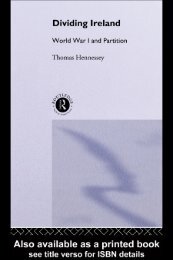Untitled
Untitled
Untitled
Create successful ePaper yourself
Turn your PDF publications into a flip-book with our unique Google optimized e-Paper software.
The implications of Alexander III’s decision<br />
Consummation 175<br />
Alexander III’s emphasis on consummation has long been recognized<br />
as decisive for the long-term history of marriage in the<br />
Catholic Church. Even so, there is room for clarification, since<br />
the point has not been spelt out in two of the best books on the<br />
history of marriage, one linking it too closely for complete clarity<br />
with the distinct issue of annulment on grounds of impotence (distinct<br />
because in the cases just discussed there is no indication of<br />
impotence), another just missing it out, though mentioning annulment<br />
for impotence and impediment of anity. So it is worth<br />
re-emphasizing that although all cases of impotence must have been<br />
non-consummation cases, the converse does not hold. With many<br />
non-consummation cases the ability of the spouses to consummate<br />
the marriage was not in doubt and not the issue.<br />
The idea that the marriage of Mary and Joseph was in a certain<br />
sense imperfect because unconsummated percolated down from<br />
speculative to pastoral theology. We find it in the late fourteenthcentury<br />
priests’ manual discussed above and also in connection with<br />
‘Bigamy’: the Pupilla oculi, by Johannes de Burgo, chancellor of the<br />
University of Cambridge. The passage is printed and translated<br />
below, as Document 4. 6. These remarks would have reached a<br />
relatively wide public, far beyond that of academic theologians and<br />
theology students, for it was well adapted to its task, and transmitted<br />
in many manuscripts and then later in print.<br />
It seems likely that papal case law prompted by actual situations<br />
Cf.e.g.G.H.Joyce,Christian Marriage: An Historical and Doctrinal Study<br />
(London etc., 1933), 428–9, 449–63.<br />
C. N. L. Brooke, The Medieval Idea of Marriage (Oxford, 1989), 132–3 and<br />
n. 37.<br />
D. Lombardi, Matrimoni di antico regime (Annali dell’Istituto storico italogermanico<br />
in Trento, Monografie, 34; Bologna, 2001), 30: ‘La questione di pi ›u<br />
dicile soluzione era quando una persona, dopo aver contratto matrimonio per<br />
verba de praesenti, ne contraeva un altro, con un secondo partner, e lo consumava.<br />
Quale dei due vincoli era valido? Le risposte date da Alessandro III mostravano<br />
ancora qualche segno di incertezza. In diverse decretali expresse la validit›a del<br />
primo, puramente consensuale, . . . In altre decretali, invece, Alessandro insistette<br />
sul valore della consumazione. Stabilݤ che il rapporto sessuale intervenuto tra il<br />
partner e un parente dell’altro, prima del matrimonio, impedisse la conclusione del<br />
matrimonio. O, ancora, che la non consumazione, a causa dell’impotenza di uno dei<br />
coniugi, rendesse nullo il matrimonio.’ Nothing here about the dissolution of the<br />
matrimonium ratum sed non consummatum.<br />
W. A. Pantin, The English Church in the Fourteenth Century, 2nd edn. (1962;<br />
repr. Toronto etc., 1980), 213–14 (and on Johannes also above, pp. 156–7 and 172).








